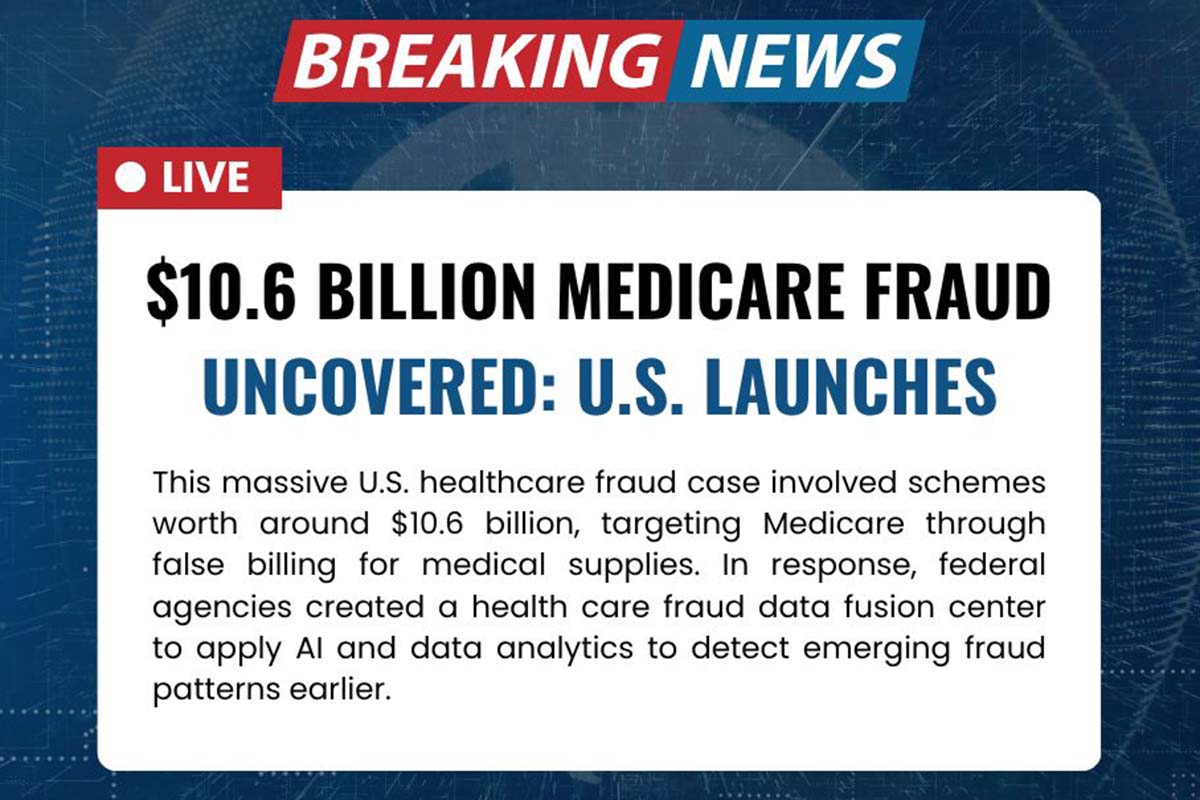False Claims Act Lawyer: A Safe Path for Healthcare Workers to Report Fraud and Earn Compensation
✨ Key Points
Healthcare workers can report Medicare and Medicaid fraud confidentially with a False Claims Act lawyer.
Whistleblowers may receive 15–30% compensation when fraud recovery is successful.
FCA lawyers protect healthcare professionals from retaliation while guiding them through the qui tam process.
Why the people who notice problems first are often the ones who have no idea what to do next — and why that’s exactly where a false claims act lawyer steps in.
I had this moment the other day when I ran into a friend who works at a clinic.
You know when someone tries to act normal, but you can see in their eyes that something is off?
That was her. And because work has become everyone’s biggest stressor these days, I asked, “Okay, what’s going on at work?”
She took a deep breath and said,
“I think something weird is happening with our billing… but I don’t want to sound crazy, and I have no idea what to do.”
Well, nobody becomes a nurse, or a physician assistant, or a billing specialist — not even department managers, clinical directors, or administrators — to go hunting for fraud.
You go into healthcare to help people, to keep things running smoothly, to make sure patients get the care they need… not to police Medicare codes.
And if you’re a Millennial — the generation that was basically raised to “do everything right,” follow the rules, double-check everything, and never cause trouble — this hits even harder.
You try to be the responsible one, the reliable one, the one who keeps the system going even on the days it feels like it’s falling apart.
But sometimes, in between patient charts, rushed signatures, compliance meetings, and those never-ending billing summaries… something just doesn’t add up.
And it bothers you because you’re wired to notice when something looks off. Millennials are like that — the internal “this isn’t right” alarm never fully shuts off.
As we talked, she mentioned she had started noticing little things: a code that didn’t match the actual service, a “visit” the patient never actually had, and even a supervisor casually telling her, “Don’t worry about it, just process it.”
And for someone who’s spent their whole life trying to do everything right, that kind of moment hits different.
It feels like you’re being pushed into a situation that goes against every value you were raised with — and it becomes impossible to ignore.
“Don’t worry about it, just process it.” It sounded like an episode of “The Resident.”
She looked at me and said, “I feel like… am I the only one noticing this?”
So I told her exactly what I learned after four years working at a law firm:
If Medicare or Medicaid funds are being misused, you’re not crazy — and you’re definitely not alone.
And yes, you have both the right and the legal protection to do something about it.
That’s when the role of a False Claims Act lawyer for health services becomes so important.
Not because you want drama or attention, but because you deserve clarity, safety, the truth about what’s actually happening — and yes, compensation if fraud is confirmed.
So let’s talk about it — like two friends trying to make sense of a complicated situation.
I’ll walk you through what this really means, what protections you have, what compensation whistleblowers may receive, and how these cases actually work.
What Healthcare Fraud Actually Looks Like Today
Healthcare fraud isn’t some dramatic movie moment with people running down hallways and alarms going off.
It usually sneaks into the day-to-day things — the billing codes you see a hundred times a week, the paperwork you sign without thinking, the numbers that don’t match the story in the patient chart.
And because you’re the one inside the system — whether you’re a nurse, a PA, a manager, or the person overseeing the entire department — you’re the first to feel that tiny “wait… something’s off here” moment.
You notice the small details long before anyone outside would ever catch them.
Common Medicare and Medicaid Fraud Patterns
Some of the most frequent healthcare fraud schemes include:
Billing for patients who were never seen;
Charging for procedures never performed;
Upcoding — using higher-paying codes than the ones that match the actual service;
Billing unnecessary medical services;
Splitting one visit into multiple claims to increase payment;
Double billing Medicare/Medicaid for the same service;
Charging for medical supplies that were never delivered;
Falsifying provider presence (“incident to” billing;)
Kickbacks for referrals or prescribing patterns.
These red flags don’t always happen in isolation — sometimes they occur repeatedly or form noticeable patterns.
Billing Red Flags Healthcare Workers Often Notice
You don’t have to be a billing expert to feel when something isn’t right.
Healthcare workers notice these things all the time, even if they don’t always know what they’re looking at.
Maybe you’ve seen a chart that magically grows more services after the patient leaves.
Maybe you’ve watched someone “fix” a code without explaining why.
Maybe you’re signing off on something and you get that tiny gut feeling… this doesn’t match the story.
Here are a few things people quietly notice before they even realize it might be fraud:
Documentation changed at unusual times;
Providers pressured to sign off on incorrect charts;
Compliance teams being ignored;
Patients confused about “treatments” they never received;
Claims submitted before notes are completed;
Supervisors telling staff “that’s just how we do it”.
If any of this sounds familiar, you’re not alone — and you’re not imagining it.
Why Fraud in Health Services Is Rising Nationwide
The healthcare system today is nothing like the one most people imagined when they started their careers.
It’s bigger, faster, more chaotic, more pressured… and sometimes it feels like the whole thing is held together with coffee, copy-paste charting, and pure willpower.
And when a system gets this big and this messy, fraud doesn’t just slip through — it thrives.
Healthcare is one of the largest federal spending areas in the entire country. And wherever there is massive money flowing, there’s always going to be someone trying to take advantage of it.
Here’s the uncomfortable truth nobody wants to say out loud:
Fraud isn’t rising because people suddenly became “more unethical.”
It’s rising because the system makes it incredibly easy to hide things in the noise.
Fraud increases because:
Systems are complex;
Billing is fast-paced;
Documentation is overwhelming;
Oversight is inconsistent;
Some facilities prioritize revenue over patient care.
Whistleblowers are the government’s #1 source of detecting fraud.
When Healthcare Workers Should Speak to a False Claims Act Lawyer
Here’s the thing nobody talks about: you don’t reach out to a false claims act lawyer because you’re excited about legal processes.
You reach out because something inside you is getting heavier — the worry about your license.
The pressure you feel in your chest when you sign off on paperwork that doesn’t sit right, the guilt of wondering if patient care is being compromised, and that little fear in the back of your mind that if this blows up one day, your name might be on a chart you never wanted to be responsible for.
It’s not just “clarity” you’re looking for.
It’s being able to sleep without replaying the same red flag.
It’s wanting to protect yourself without starting a war.
It’s wanting to do the right thing without losing your job, your reputation, or your peace of mind.
And I’ve seen this play out in real situations:
a nurse realizing a patient was billed for care on a day she wasn’t even in the building,
a billing specialist watching codes get “adjusted” with no explanation,
a department manager feeling pressured to hit numbers that make zero medical sense,
a clinic director wondering why contracts are triple their real cost.
And yes — if Medicare or Medicaid funds are being misused, you’re not imagining things, you’re not alone, and you may also be eligible for 15–30% of whatever funds the government recovers.
It’s not a “reward,” it’s recognition: you stepped up when nobody else did.
Signs You Are Looking at FCA-Qualifying Fraud
Reach out if you see:
Repeated billing inconsistencies;
Pressure to approve incorrect documentation;
Unnecessary tests ordered for financial gain;
Fake patient records;
False claims submitted to Medicare/Medicaid;
Kickback schemes involving referrals or prescriptions
The law is clear: If federal money is involved, fraud is a federal offense.
How to Know if What You Saw Is Illegal
A False Claims Act lawyer will help you determine:
Does it violate federal billing guidelines?
Is it intentional or negligent?
Is it isolated or systematic?
Does it involve government-funded programs?
Most healthcare whistleblowers aren’t looking for trouble — they’re looking for the truth.
Why Reporting Internally Is Sometimes Risky — And Why Protecting Your License Comes First
Here’s the truth I always share with friends in healthcare: your license is your life. Your license is your stability, your future, your income… everything.
And when something feels off with Medicare or Medicaid billing, you absolutely cannot risk being dragged into someone else’s bad decisions.
Not your manager’s decisions. Not the clinic’s decisions. Not the system’s decisions.
So when people tell me, “Maybe I should just report this to my supervisor first,” I always say the same thing:
Please don’t. Not yet. Not without protection.
Because here’s what actually happens inside workplaces — and you know this is true:
Your report can get “lost.”
Someone can quietly rewrite the paperwork.
A manager can suddenly decide you’re “not a good fit.”
HR can start building a file on you instead of the problem.
People who feel threatened can turn defensive — fast.
Evidence gets “updated” or deleted before anyone outside ever sees it.
And suddenly you, the person who was trying to do the right thing, gets pulled into something you never created.
The worst part? If the government later investigates, your name might be on charts you signed — even if the fraud wasn’t your idea.
That’s why reporting internally feels risky. Not because you’re wrong… but because you’re surrounded by people who may want this to disappear quietly.
And this is where I always bring it back to the most important thing:
Your license comes before their comfort.
Your career comes before their corporate image. Your future comes before their billing department.*
Talking to a False Claims Act lawyer doesn’t mean you’re declaring war. It just means you’re protecting yourself before you say a single word at work.
A lawyer helps you figure out:
what NOT to say so you don’t put your license at risk;
how to document things legally and safely;
how to avoid being blamed later;
how to keep your name confidential;
how to make sure you stay protected no matter what your workplace does.
You don’t owe anyone internal loyalty when your license is on the line
Healthcare workers are trained to protect patients — but nobody teaches you how to protect yourself.
A False Claims Act lawyer does exactly that. They make sure you don’t accidentally expose yourself to retaliation, drama, or legal trouble.
So yes, you should speak up — but do it the right way, the protected way, the smart way.
What a False Claims Act Lawyer Does for Health Services Whistleblowers
Here’s what you get when you talk to an FCA lawyer:
Confidential Case Review
They listen to your experience, review documents, and help you understand whether your concerns point toward legitimate fraud.
Protecting Your Identity Under Seal
All whistleblower cases are filed under seal, meaning:
Your employer doesn’t know;
Your coworkers don’t know;
Nothing becomes public;
Your name is legally protected.
Filing a Qui Tam Case on Your Behalf
A qui tam case is a lawsuit filed by a whistleblower on behalf of the U.S. government.
Your lawyer handles everything:
Drafting the complaint;
Filing it properly;
Communicating with the Department of Justice;
Managing deadlines, evidence, and strategy;
You are never expected to navigate this alone.
Protection Against Employer Retaliation
If your employer retaliates in any way, the FCA protects you and allows for:
Reinstatement;
Double back pay;
Compensation for damages;
Legal fees paid by the employer.
The law is built to protect the people who do the right thing.
Real Examples of Healthcare Fraud Cases in the U.S.
Healthcare fraud isn’t hypothetical — it happens every year.
✨Medicare Billing Fraud Cases
Examples include:
Home health agencies billing for visits never performed
Clinics submitting claims for dead patients
Nursing facilities charging for “therapy sessions” that never occurred
✨ Medicaid Kickback Schemes
These cases involve:
Doctors paid to prescribe certain medications
Hospitals illegally rewarding referrals
Labs offering “incentives” for unnecessary testing
✨ Home Health & Nursing Facility Fraud
Often involve:
Fake patient enrollments;
Billing for hours never worked;
Inflated visit counts;
Falsified nurse signatures;
✨Pharmaceutical & Medical Device Fraud
Companies have been caught paying kickbacks to:
Encourage certain prescriptions
Recommend unapproved uses
Influence clinical decisions
The biggest fraud cases in history have come from healthcare.
Compensation and Rewards for Healthcare Whistleblowers
Here’s the part many people don’t realize:
Whistleblowers may receive 15–30% of the total money recovered.
And healthcare fraud cases often involve:
millions;
tens of millions;
sometimes hundreds of millions
You are compensated for your courage.
How FCA Whistleblower Rewards Are Calculated
You may receive more if you:
Provide strong evidence;
Help investigators;
File early;
Identify widespread fraud.
Why Healthcare Cases Often Lead to Large Recoveries
Because healthcare is one of the largest federal spending areas — and fraud is widespread.
✨Examples of Multi-Million Dollar Whistleblower Payouts
Real cases include:
$30M whistleblower share in a hospital billing case;
$12M paid to a nurse who exposed unnecessary procedures;
$8M to an auditor who identified false lab billing.
The government wants insiders to speak up.
Why Reporting Fraud Protects Patients, Taxpayers, and the Entire Healthcare System
Fraud isn’t a victimless crime. Every fraudulent claim:
Raises healthcare costs;
Reduces resources for real patients;
Damages program integrity;
Hurts low-income and elderly populations;
Wastes taxpayer money.
When you expose fraud, you protect:
patients;
public funds;
ethical providers;
the healthcare system.
What to Do If You Suspect Medicare or Medicaid Fraud
Here are the safest steps:
Steps to Take Before Talking to Anyone at Work
Do not accuse anyone;
Do not confront supervisors;
Do not download files from restricted systems;
Do not tell coworkers;
Write down what you observed (privately;)
Call a False Claims Act lawyer.
What Not to Do (Protecting Yourself Legally)
Don’t collect evidence illegally;
Don’t forward patient files;
Don’t send documents to personal email;
Don’t talk to Human Resources first;
Your lawyer will guide you legally and safely.
How to Speak Safely With a False Claims Act Lawyer
Most offer:
Free consultations;
Confidential calls;
Guidance on protections;
Zero upfront fees (they’re paid only if you win)
You’re not committing to anything; you’re just learning your rights.
Free Consultation and Confidential Guidance
If something in your workplace doesn’t feel right — a billing pattern that makes no sense, a chart that doesn’t match the care you saw, or a code that keeps getting “fixed” — trust that instinct.
People in healthcare notice these things because they work with them every day, and your intuition is often the first sign something is off.
And truly, you’re not imagining it. When good, ethical people see the same inconsistencies over and over, it usually means they’re real.
You’re just the one who noticed first — and that doesn’t make you the problem; it makes you valuable.
The government relies on people like you to bring these issues forward, but you should never do it alone.
Talking to a False Claims Act lawyer isn’t about starting drama — it’s about protecting your license, your career, and your peace of mind while getting real answers.
And yes, if fraud is confirmed, the compensation available to whistleblowers can do more than just ease the stress you’ve been carrying. It can give you stability, breathing room, and maybe even the chance to start a new chapter in your life with far more confidence.
You’re allowed to protect yourself. You’re allowed to ask for help. And you’re absolutely allowed to do the right thing — safely.
A False Claims Act lawyer can help you understand what you’ve seen, protect you legally, and guide you toward potential compensation.























